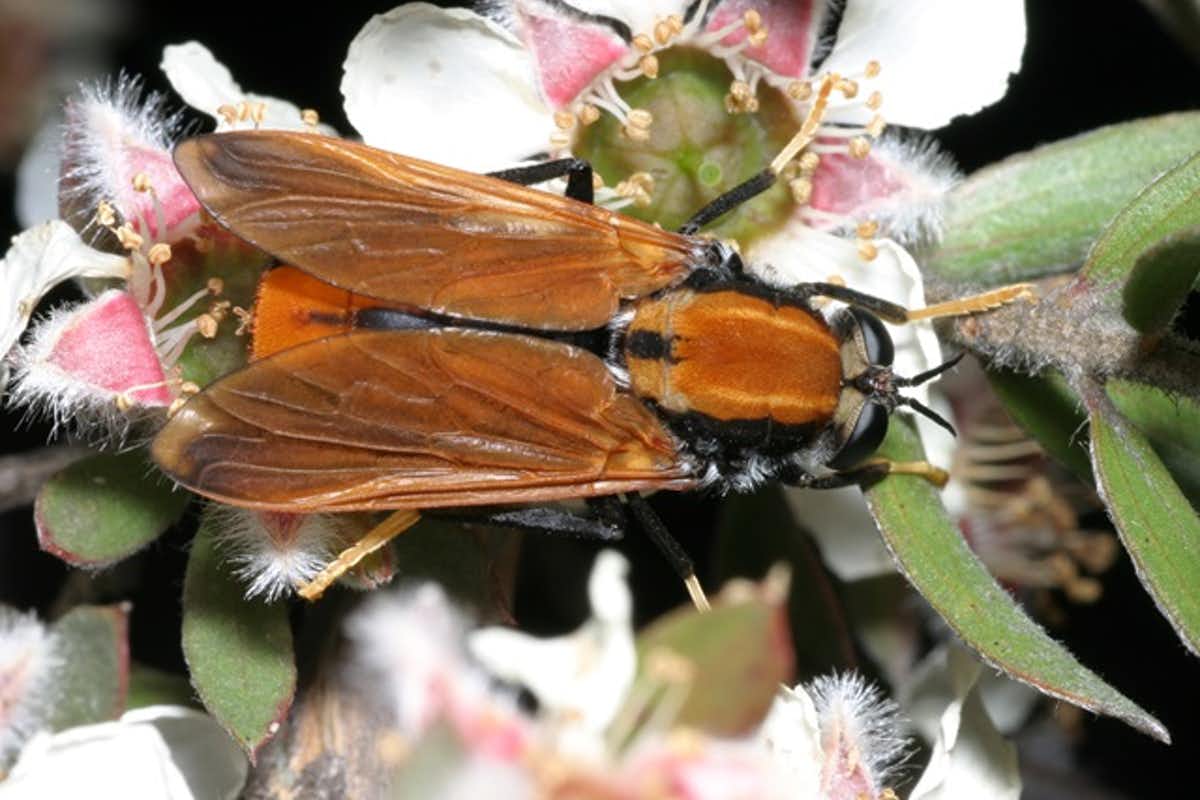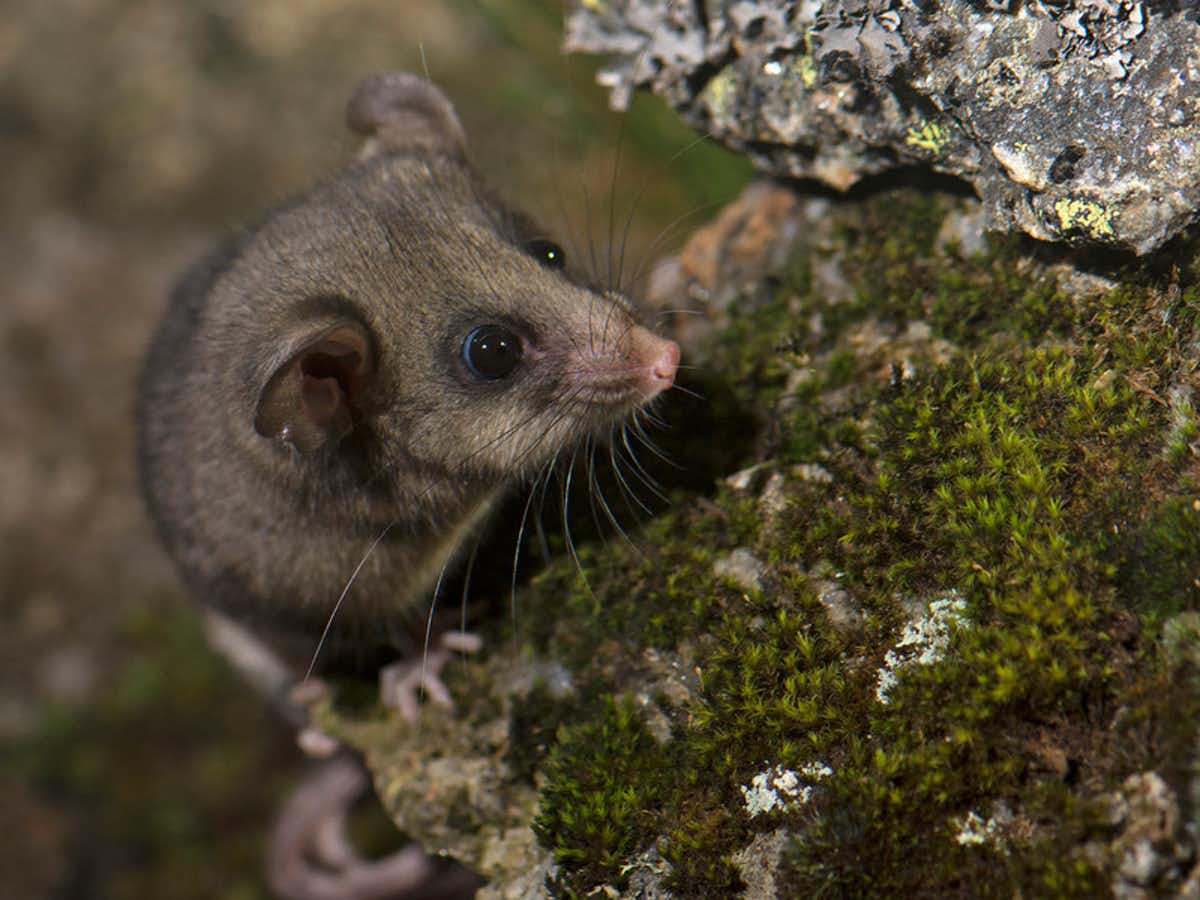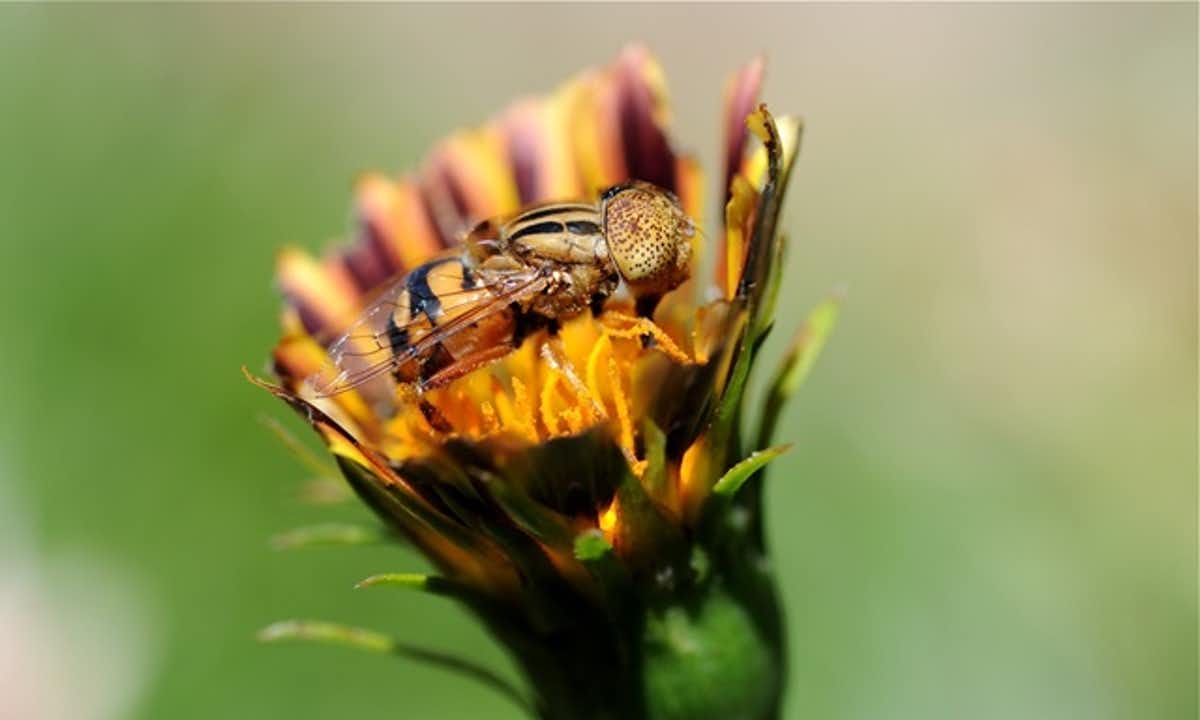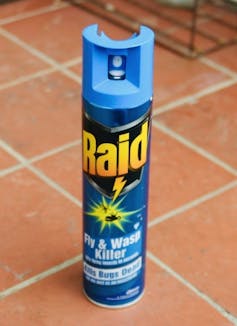Are you planning a big garden clean-up this summer, or stocking up on fly spray to keep bugs at bay? Before you do, it’s worth considering the damage you might cause to the insects we share the planet with.
Australia’s insect populations are under pressure. The problem is better known in the Northern Hemisphere, where over the past few years scientific studies have reported alarming declines in insect numbers.
We don’t yet have a true understanding of what is happening in Australia. This week, scientists gathered in Brisbane at the Australian Entomological Society conference to discuss the extent of the problem. Evidence suggests several species and populations are under threat.
Some might see insects as small and insignificant, but they perform functions crucial to sustaining life on Earth. There are several simple steps you can take to address insect decline in your area, or even help scientists keep tabs on the problem.

A gold wasp. Australian insect declines have not been well documented. Image credit: Oliver Niehuis/Australian Science Media Centre
We need to know more
In Australia, we know iconic species such as the bogong moth, green carpenter bee and Key’s matchstick grasshopper are in decline. There is documented evidence for the extinction of two Australian insect species, but this is probably just the tip of the iceberg.
A research review published this year suggested more than 40% of insect species globally are threatened with extinction over the next few decades. However, this estimate was based on limited studies of a few iconic insect groups in western Europe and the US.
Such findings should be taken with caution. We do not have enough evidence to extrapolate to the whole planet.
Despite this, factors affecting insect populations overseas – such as habitat loss, climate change and insecticide use – most likely also apply in Australia. Bushfires and drought on this continent can also affect insect populations.
There are no published studies documenting insect decline in Australia, but anecdotal reports from entomologists suggest lower than average populations across a number of species. However, very few of our estimated 250,000 insect species are being formally monitored.

A Pelecorhynchid fly. Studies suggest insect populations are declining, but data in Australia is scarce. Image credit: CSIRO Entomology
Why you should care
Insects pollinate plants, dispose of waste and control pests, among other functions. The planet would cease to support life without the services insects provide.
If insect populations are in decline, so are the populations of larger animals such as birds and lizards that feed on them.
In NSW, bogong moths are a staple food for mountain pygmy possums. A collapse in the moth population would lead to possums going hungry, which affects their breeding success.
Australia’s threatened species strategy prioritises action to protect 20 bird species – 14 of which feed partially or solely on insects.

Mountain pygmy possums feed on bogong moths. Image credit: Tim Bawden
Six ways to help insects
Insects are small and can inhabit hidden places, so you may not realise how many exist around you. Here are a few ways to help prevent insect decline in your home and elsewhere:

A flower fly. Scientists need help form the public to track insect numbers. Image credit: Denis Anderson/CSIRO

- Entice insects to your garden: Lawn is a virtual desert for insects, so if you don’t really need it, cultivate insect-friendly native plants instead. Plan to have something flowering most of the year and aim for a variety of plant heights and structures, such as tall trees, thick shrubs and ground cover.
- Put the fly spray away: Insecticides have become very efficient in recent years. They indiscriminately kill all insects, not just the ones you’re trying to get rid of. If you have to use insect spray, do so sparingly. And whenever you can, choose food produced without lots of pesticides. These products are sold with labels such as organic, biodynamic, or chemical-free.
- Turn off the lights: If you don’t need that outdoor light on all night, turn it off: the moths in your area will thank you. Many nocturnal insects can’t resist the light, but it disrupts their navigation system. This plays havoc with their ability to feed and reproduce.
- Build them a home: Think about installing an insect hotel – a small structure of hollows for insects to rest and lay eggs in. Or simply leave dead wood or small areas of bare ground for insects to build nests in. If you don’t have a garden, join a local tree-planting group, or convince your council to plant more natives.
- Resist the urge to clean up: If there is a section of your garden, local park or nature strip that is unkempt, leave it that way. What looks untidy to you is a great place for insects to live.
- Track insects on your smart phone: Scientists need help to better understand what is happening to our insects. Citizen science apps such as iNaturalist Australia, Wild Pollinator Count, the Atlas of Living Australia and Butterflies Australia help gather valuable information about insect biodiversity, so solutions can be targeted to problem areas.

This article is republished from The Conversation under a Creative Commons license. Read the original article.


27th February 2020 at 8:15 pm
Please tell Dawson’s pest control to stop spraying properties in very fragile areas like around the great ocean road. Dawsons are meant to kill things (pests species) in a house not spray poison over a whole yard that has mainly indigenous insects. How do they have tht right just becasue someone decide they come to the bush but don’t like insects in their garden? They should not have the right to kill things that belong here. Why is there no regulation of what they kill. They are not pests. Insects live here and the bush will die off if we indiscriminately kill them. Cabbage whites are one few things introuced, mosquitoes are a problem because of the swamp in our Park and no flow of water into our river becase of what Alcoa did. It doesnt seem anyone cares about insects. Now Im looking at a yard that every native insect like native bees and other important moths whose caterpillars eat leaf litter have just been killed off. They are not pest insects and not inside. We live in the bush. If we want to save this precious area something needs to be done about things like this. I have noticed a terrible drop in the number of insects here. I have studied entomology through the university of queensland so I am aware of what I am saying. We are getting more stupid is what I think. People’s preocupation with manicured lawns is crazy, especially when they even bring in instant turf with forgein soil and proably introduced suburban insects too. We are just stupid and brainwashed. only a few insect species are actually pests and most of them are introduced. I have not seem one huntsman inside in over a year and in the last 50 I have always had a hunstman that meant I saw few other spiders inside. We use to have hundreds of a particular butterfly in our front yard every year, one of the browns. this whole spring/ summer we have only seen a handfull of them. I photograph moths and have not been able to attract anyto my backyard lights like I have other years in the past twelve months. This last year was dramatically differnt. Even to the point of not seeing many hover flies for a long time. This is the bush, how come these insects are disappearing? How can this be happening? BTW insect lights kill more predators of pest insects than they do pests. you shouldn’t use them. It is a con. mosquitoes are attracted to peoples smells. The lights kill the good guys. Greed and ignorance drives that market. stop using them you are making the problem worse.We need to stop this thing that makes us want to kill everything. Insects perform reallly improtant jobs, the nuts and bolts of the whole ecosystem and we are removing them one at a time. Is ignorance bliss?
6th February 2020 at 12:25 pm
As long as fly spray, round up, snail baits, bug zapperes, etc are readily available to purchase everywhere, we are never going to replenish the low numbers of insects. Very sad actually. I have stopped using these products, but many haven’t. It is not widely reported enough.